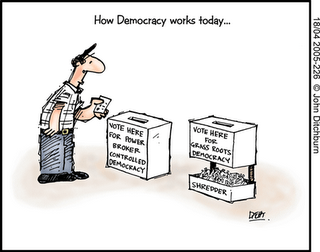 We Americans are all too willing to fight and die for democracy but do we live the lives of a truly democratic people?
We Americans are all too willing to fight and die for democracy but do we live the lives of a truly democratic people?It is a mistake to think of political systems in terms of “either/or,” particularly when it comes to democracy. “Democracy” is a yard stick and systems can be either more democratic or less so. I would argue (and promise to do so in the future) that our “Rube Goldberg” federal system of government is less democratic than many parliamentary systems. Think of our current situation when the President’s approval rating falls below 40% and there isn’t a damn thing the American people can do about it because he has a fixed term.
However, there is more than just structure – there is economic power which distorts the whole process. Everybody gets one vote and as important as single votes are wealth can cancel out a lot of single votes. Is this still a democracy? Yes. But what kind of democracy is it? Is it satisfying? Does it meet our needs? Are Americans willing to fight and die because they have defined democracy down to a system that offers them a choice between shopping at Walmart versus Target?
Frances Moore Lappe, the author of Diet for a Small Planet and advocate in issues pertaining to world hunger, has a short article in UU World about what she calls Thin Democracy and Living Democracy. (UU World is the official publication of the Unitarian Universalist Association.) Approaching the issue of democracy from the perspective of the distribution of food she rightly recognizes that hungry people are never powerful (or, alternatively, powerful people never go hungry). However, democracy comes in greater and lesser forms, which she calls Thin Democracy and Living Democracy. She writes,
... what does democracy look like, that is strong and vital enough toYou may read the entire article here.
get at the roots of hunger? And how do we build it? I’ve come to believe that
there are no more important questions, and the journey to answer them has taken
me to five continents and deep within myself.
Like most Americans, I grew up with the notion that democracy
boiled down to two things: elected government and a market economy. Since we
have both, there wasn’t much to do except show up at the polls and to shop.
Voilà, we have democracy!
From there it was easy to jump over the unpleasant fact that
democracy and the now-dominant version of a market economy are actually based on opposing principles. Democracy depends on the wide dispersion of power so that each of us has a voice. But our peculiar version of the market is driven by a
single rule, highest return to existing wealth, that does the opposite: It
inexorably concentrates wealth and power, denying people a real
voice.
In this single-rule economy, growth can’t end poverty. During the
1990s, every $100 in economic growth worldwide brought just 60 cents in poverty reduction, according to a New Economic Foundation report. Worldwide, 691 billionaires control more wealth than the poorer half of the population earns in a year.
The U.S. Census Bureau reports that between 1979 and 2001 the
income of the top 20 percent of earners in the United States increased by more
than half, while the bottom 20 percent saw virtually no gain. According to an
Economic Policy Institute study, the average CEO in America now earns as much by lunchtime on the first day of the year as a minimum wage worker earns the entire year!
Such extreme concentration of wealth overwhelms elected governments
and destroys open markets. Sixty-one lobbyists now walk the corridors of power
in Washington, D.C., for every elected representative. I call this unworkable
frame Thin Democracy.
Thin Democracy cannot address our planet’s interlinked crises. By
their very nature, our biggest problems don’t yield to top-down strategies;
solutions require invention and widespread changes in behavior that depend on
the experience, ingenuity, and buy-in of citizens closest to the problems. Yet,
in concentrating power, Thin Democracy excludes precisely the broad-based
engagement we need.
… Thin Democracy can’t create healthy societies because it denies
human complexity—our innate need for community, for basic fairness, and for
efficacy in contributing to something grander than our own survival. Forcing us
to bury these deep needs, Thin Democracy leaves many feeling alienated and
powerless. …
… Thin Democracy’s demeaning materialist premise and dismissal of
citizens’ voices make it frighteningly vulnerable to extremist ideologies—both
religious and secular—that claim high moral ground and offer transcendent
visions.
… a new frame for democracy is emerging. I call it Living
Democracy.
It’s not something done for us or to us; it’s what we ourselves do.
Living Democracy is not a set system but a set of system characteristics, ever
evolving and driven by human values that span all great wisdom and religious
traditions. Among them are inclusion, fairness, and mutual accountability.
It is not about simply dividing up power in new ways; it is about
generating new power to create the world we want. Very practically, it means
removing the power of money from decision-making and infusing the power of
citizens’ voices throughout public life…
To uproot feelings of powerlessness we must struggle to define the
bucket—to consciously construct a new frame that gives meaning to our actions.
And that begins when we recognize that our multiple crises are neither separate
nor random: They flow from a partial, and thus distorted, view of our nature,
which leads us to turn over our fate to forces outside of our control,
especially to a one-rule economy that violates our deepest sensibilities.
No comments:
Post a Comment